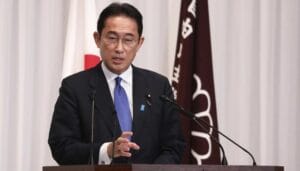Japan PM on ties to ultra-conservative Unification Church
Japan’s Prime Minister Fumio Kishida said Monday that he will humbly listen to people’s “harsh voices” criticizing his governing party’s cozy ties to the ultra-conservative Unification Church and help victims of its allegedly fraudulent businesses and huge donation collection

Japan’s Prime Minister Fumio Kishida said Monday that he will humbly listen to people’s “harsh voices” criticizing his governing party’s cozy ties to the ultra-conservative Unification Church and help victims of its allegedly fraudulent businesses and huge donation collection.
Kishida has come under fire in a widening scandal that has exposed decades of close ties between former Prime Minister Shinzo Abe, who was assassinated in July, his ruling Liberal Democratic Party and the Unification Church, which has been accused of raking in huge donations by brainwashing adherents.
Kishida has split public opinion by honoring Abe with a state funeral, which opponents assailed as a prewar tradition designed to stir nationalism, without an acceptable legal basis or parliamentary discussion.
Abe, on top of his divisive legacy, is now seen as a key figure behind the governing party’s church ties.
Kishida desperately needs to regain public trust for his government’s key policies, including a national security strategy that includes a preemptive strike capability, which critics say could violate the pacifist constitution.
He also plans to further promote nuclear energy to meet decarbonization and energy supply needs, despite persistent safety worries from the 2011 Fukushima nuclear disaster.
RECOMMEND STORIES
- Remembering Ratan Tata: A Visionary Leader and Compassionate Humanitarian
- National College Colors Day – September 2, 2024: history
- Bison-ten Yell Day – September 2, 2024: history, FAQs
- National Lazy Mom’s Day – September 6, 2024
- World Coconut Day – September 2, 2024: A Nutty Celebration!
“I squarely face the people’s voices regarding our relationship with the Unification Church,” Kishida said in his speech opening the 69-day parliamentary session.
He promised to “do utmost” to help victims of the church’s suspect businesses and donation collection by setting up a government help desk offering legal advise.
He’s also considering to revise the consumer contract law, but did not give details if or how he planned to pursue an investigation into how his party’s church links had affected government policies.
Amid China’s increasing assertiveness in the region and rising tension around Taiwan, which Beijing claims as its territory, as well as North Korea’s escalating missile and nuclear threats, Kishida has pledged fundamental reinforcement of Japan’s military capability to its top ally the United States and aims to nearly double annual military spending to about 2% of GDP by following a NATO example.
Kishida said he hoped to carry on dialogue to build a “constructive and stable relationship” with China, while working with the United States and other partners in the region and Europe in promoting a “free and open Indo-Pacific” vision of trade and security cooperation.
Energy supply crunch and high electricity costs stemming from Russia’s war on Ukraine prompted Kishida to order his government to speed up plans to develop and build smaller and safer nuclear reactors, known as SMRs, while accelerating reactor restarts that have come slowly under stricter post-Fukushima safety standards.
He promised to make economy his top priority and promote measures that “maximize the merit of the weaker yen” in order to collect 5 trillion yen ($34.5 billion) annually spent by foreign tourists in Japan.








